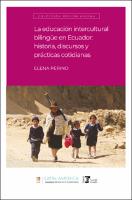La educación intercultural bilingüe en Ecuador: historia, discursos y prácticas cotidianas
| dc.contributor.author | Perino, Elena | |
| dc.date.accessioned | 2022-05-09T10:24:42Z | |
| dc.date.available | 2022-05-09T10:24:42Z | |
| dc.date.issued | 2022 | |
| dc.identifier | ONIX_20220509_9781951634261_16 | |
| dc.identifier | OCN: 1346788256 | |
| dc.identifier.uri | https://library.oapen.org/handle/20.500.12657/54335 | |
| dc.language | Spanish | |
| dc.subject.other | Kichwa | |
| dc.subject.other | Shuar | |
| dc.subject.other | Movimiento indígena ecuatoriano | |
| dc.subject.other | Revolución Ciudadana | |
| dc.subject.other | Ecuador | |
| dc.subject.other | Intercultural Bilingual Education | |
| dc.subject.other | Educación Intercultural Bilingüe (EIB) | |
| dc.title | La educación intercultural bilingüe en Ecuador: historia, discursos y prácticas cotidianas | |
| dc.type | book | |
| oapen.abstract.otherlanguage | In 1988, the first bilingual educational model in Latin America, managed autonomously by an indigenous social movement, was institutionalized in Ecuador. The will was to challenge the hierarchies of knowledge and an exclusive society. Since the colonial period, the indigenous population, their languages, knowledge and practices had been confined to a subordinate and invisible condition. It had been done through discourses and measures that imagined and manufactured 'the other as other', and reduced it to the space of the non-human, in order to legitimize exploitation and oppression. The indigenous movement, creator of the project, broke into history with the 1990 uprising, and presented itself as a subversive force whose purpose was to decolonize the Ecuadorian racist imaginary. He proposed a political and epistemological challenge, to build what Latin American critical thinking has called "critical interculturality." This proposal, different from multiculturalism, is forged in a counter-discourse that is based on creating a group ('we, the indigenous people') linked by centuries of discrimination, and an 'ancestral' and 'millennial' culture, which is recreated and reinvented claiming a new identity. In this book, the author analyzes the historical reasons why the Intercultural Bilingual Education (EIB) project emerged in Ecuador. In addition, the tensions between this, aimed at decolonizing knowledge and subverting racialized hierarchies, and how it was applied in a State that declares itself 'intercultural and plurinational'. Through an analysis that is historically based and solidly anchored in field work, she will try to answer the multiple questions that arise in the daily practice of the project. | |
| oapen.identifier.doi | 10.25154/book9 | |
| oapen.relation.isPublishedBy | 7bb6503b-ca4e-418b-905d-205dc2692bbb | |
| oapen.relation.isbn | 9781951634261 | |
| oapen.relation.isbn | 9781951634278 | |
| oapen.relation.isbn | 9781951634285 | |
| oapen.relation.isbn | 9781951634254 | |
| oapen.imprint | Latin America Research Commons | |
| oapen.pages | 239 | |
| oapen.place.publication | Quito |

